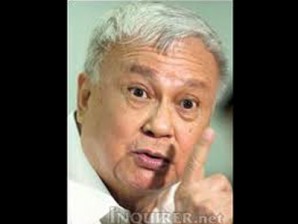Senator Joker Arroyo on Tuesday described as “bad news” the takeover of United Coconut Planters Bank (UCPB) by Jeronimo Kilayko under whose earlier management billions of pesos in alleged “behest” loans were extended to companies linked to Eduardo “Danding” Cojuangco Jr.
Kilayko, who was chairman and chief executive officer of UCPB during the Estrada administration, took over Tuesday as president and CEO of the state-owned bank upon the resignation of Ramon Y. Sy.
“It is not fair or correct that he would be appointed to that position when he caused a lot of anomalies which prejudiced our coconut farmers. There’s a reason to complain. Why should you appoint someone who created problems in the first place,” Arroyo said.
Presidential spokesperson Edwin Lacierda declined comment on President Benigno Aquino III’s appointment of Kilayko, announced last month by his deputy, Abigail Valte.
Lacierda said he still had to ask Andy Bautista, chairman of the Presidential Commission on Good Government (PCGG), adding that “I’m not familiar with the process.”
Estelito Mendoza, counsel for Cojuangco, said the chairman of San Miguel Corp. (SMC), one of the country’s highly diversified conglomerates, had nothing to do with the appointment of Kilayko. Mendoza added that the alleged questionable loans had been settled and that the issue had become “moot and academic.”
Cojuangco, an uncle of President Aquino and a major contributor to his election campaign last year, headed UCPB during the martial law years. In 1983, he acquired a majority stake in SMC then worth P2 billion, allegedly using coconut levy funds in violation of his fiduciary trust as head of the bank established for the benefit of coconut farmers.
The block of shares was sequestered following the ouster of the dictator Ferdinand Marcos in 1986.
Privatization proposed
Senator Ralph Recto, chairman of the Senate committee on government corporations and public enterprises, said Tuesday that his panel had drafted a report declaring assets acquired using the coconut levy imposed during the martial law years from 1973 to 1982 as public funds.
Recto told the Philippine Daily Inquirer that the recommendation, if passed into law, would preempt a decision by the Supreme Court that has yet to decide on the 27-percent block of sequestered SMC shares allegedly bought with coco levy funds. The court resolved questions on another 20 percent of the SMC shares in favor of Cojuangco in April.
Recto said this block of shares was now valued at P120 billion under the Coconut Industry Investment Fund (CIIF) which lists 14 companies.
“We plan to declare the CIIF as public funds. The Supreme Court is slow. So, we’ll just do it right away,” Recto said in an ambush interview.
Asked whether such a preemptive move could upset the high tribunal, the senator said: “It would be Congress and the Executive moving toward a solution.”
“Whether it becomes a political question, I think so. But we’ll have to take this step for the farmers. We have to give back even some (of the funds) to them. This is a political step. That’s basically what it is,” Recto explained.
Publicly owned assets
The senator’s office said the committee held two hearings on UCPB operations and several informal meetings with various resource persons before drafting the report.
Under the draft report, once all remaining coco levy funds and assets acquired using these are declared as public funds, the Privatization and Management Office will privatize all these assets.
Upon privatization, the funds generated shall then be transferred to a trust fund to be known as the Coconut Industry Fund (CIF) which shall be created through legislation.
The report said the CIF would be an “irrevocable trust fund” that “shall exist for … 10 years” once the consolidated bill passed by the Senate and the House of Representatives is signed into law.
Preferred shares
The report added that these holding companies have a total of 753,848,312 preferred shares in SMC representing 27 percent of the total outstanding capital stock of the corporation.
Recto said that so far, the committee had considered two ways to utilize the resulting CIF.
“If I had my way, the liquidated funds would be placed under the Office of the President. A committee would be formed to handle it. Members would include representatives of the coconut farmers,” the senator said.
“The other method is put it in the general fund. It (would be) a special fund but every congressman can see it (but) let it be appropriated for coconut farmers,” he added.
What’s the benefit?
The senator stressed that the resulting funds could be used “to make reinvestments in the coconut industry because the coconut has a lot of by-products.”
“For example, cooking oil will increase in price as China gets richer. They will fry more food and need more coconut oil. We have to prepare for that. (The funds have) been idle all along. We’re talking of P120 billion,” Recto noted.
Senator Arroyo, however, wants the Senate to determine how exactly the coconut farmers would benefit from any liquidation of assets stemming from coco levy funds.
“The heart of the problem is that after 30 years, the coconut farmers have yet to benefit from this fund. If we use the fund again for the industry and for the owners but not for the farmers, there would still be no justice,” he said. With a report from Christine O. Avendaño
